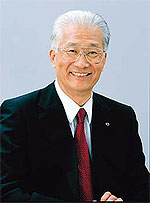News - MazdaMazda readies for hydrogen societyHydro-power: Mazda's RX-8 Hydrogen has hit the road in Japan. Mazda chooses weight and emissions cuts over electric power as hydrogen world nears12 Aug 2008 MAZDA won’t be joining the global contest to release hybrid or fully electric vehicles until beyond 2015. Instead, as Mazda Motor Corporation (MMC) president Hisakazu Imaki told journalists during his third official visit to Australia last week, the rejuvenated Japanese car-maker has embarked on a radical weight-reduction program to slash fuel consumption as it ramps up production of a range of new alternative-fuel models in preparation for what it predicts will be a hydrogen-based society. “We are working on multi-solutions but we are focussed on conventional technologies because we need to reduce total emissions,” said Mr Imaki, a 43-year Mazda veteran who has headed MMC since August 2003. “We’ve already announced a 30 per cent reduction in fuel consumption for our fleet by 2015, which does not include alternative fuels like hydrogen. We have to implement this in chronological order. “Hydrogen may be one of those (future alternative fuels), but in the short term we want to reduce weight and increase efficiency of our existing technologies. “If you truly consider the global environment you have to think of the total amount – not the emissions of single cars but the amount multiplied by the number sold.  Left: Mazda president Hisakazu Imaki. Left: Mazda president Hisakazu Imaki.“For example, if a technology allows you to reduce fuel consumption by 50 per cent, let’s say the number of vehicles is just 20 per cent of the total sold, the remaining 80 per cent has existing engines, so our view is that unless you improve the fuel economy by volume you won’t truly contribute. “That’s why we’re working on reduced friction in engines and transmissions. There will be differences in reductions in cars, but overall the reduction will be 30 per cent,” he said. Mr Imaki said the race to build plug-in electric cars was natural, but reiterated that they are not the exclusive answer to lowering car-makers’ total CO2 outputs, adding that focussing on electric technology alone would neglect the emissions performance of the conventional petrol engines that continue on sale. “I’m not in apposition to criticise others’ policies. Plug-in is a completely understandable concept and we are also working on multiple solutions. “(But) A key point is none of these manufacturers have committed to making 100 per cent of their cars plug-in – they are all working on a variety of options.” Mr Imaki forecast a global shift away from petroleum-based fuels to hydrogen, and that Mazda was even better placed to capitalise on this than BMW, whose new Hydrogen 7 limousine burns liquefied hydrogen in its combustion engine. Mazda’s hydrogen-powered RX-8 rotary, public road testing of which was recently approved in Japan ahead of sales later this year, employs compressed hydrogen, which Mazda says is more efficient. It has supplied a limited number of examples for a hydrogen-based Norwegian transport plan, and has also developed a hydrogen/hybrid version of the Premacy/Mazda5 not sold here. “If you look into the far, far future, then eventually, our society will evolve into a hydrogen-based society,” said Mr Imaki. “Here (in Australia) the use of hydrogen is not highly valued. (But) Some countries like Norway are working on grand projects nationally, for which we will supply the hydrogen-powered RX-8. “We are looking to a hydrogen-based society and there has been a keen interest in hydrogen. How soon this happens depends on government policy. “Hydrogen is something we have in common with BMW, but the concept is different. Norway selected us, not BMW,” he said. The 65-year-old Mazda chief said that rising global fuel prices were due more to artificial economic reasons than increased demand, and that the world’s petroleum-based fuel stocks would not be depleted within the next few decades. “It is very far away before we run out of petroleum, so in the meantime we need to look after the environment. “The recent soaring of petroleum prices is not due to demand but financial speculation. America is the country most affected by petroleum prices. “We know that fuel is running out and that prices are soaring. (But) Oil won’t run out in my lifetime.” The race to deliver Australia’s first plug-in electric vehicle is being contested by Mitsubishi, whose i-MiEV Sport could be here as early as 2010, and General Motors, whose Chevrolet Volt is expected by 2012. BMW has announced it will decide this year whether to develop an electric car, while other major car-makers that have already committed to doing so include Nissan-Renault and the majority shareholder in Mazda itself, Ford. Read more:Mazda wields fuel consumption knife |
Click to shareMazda articlesResearch Mazda Motor industry news |














Facebook Twitter Instagram